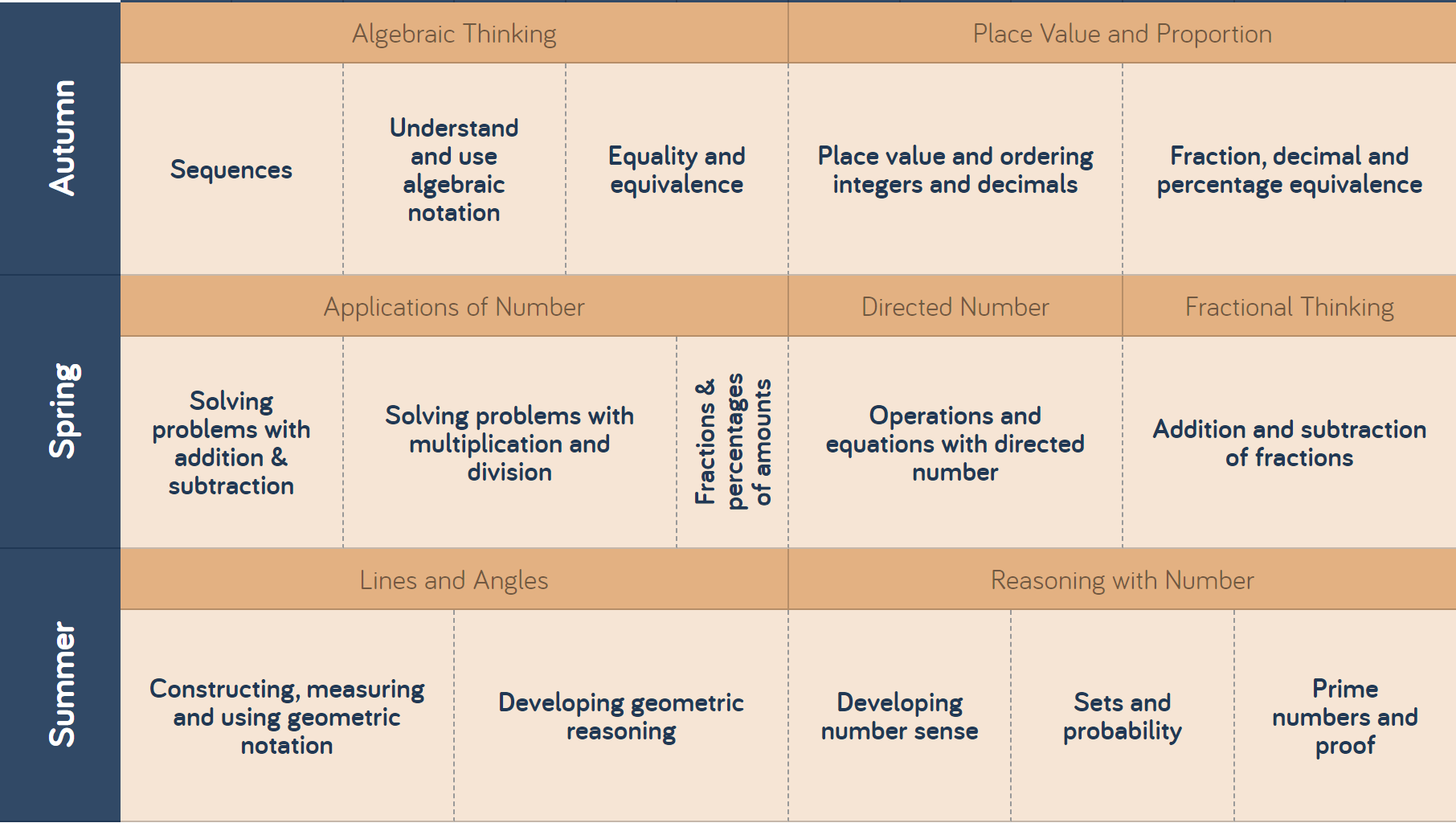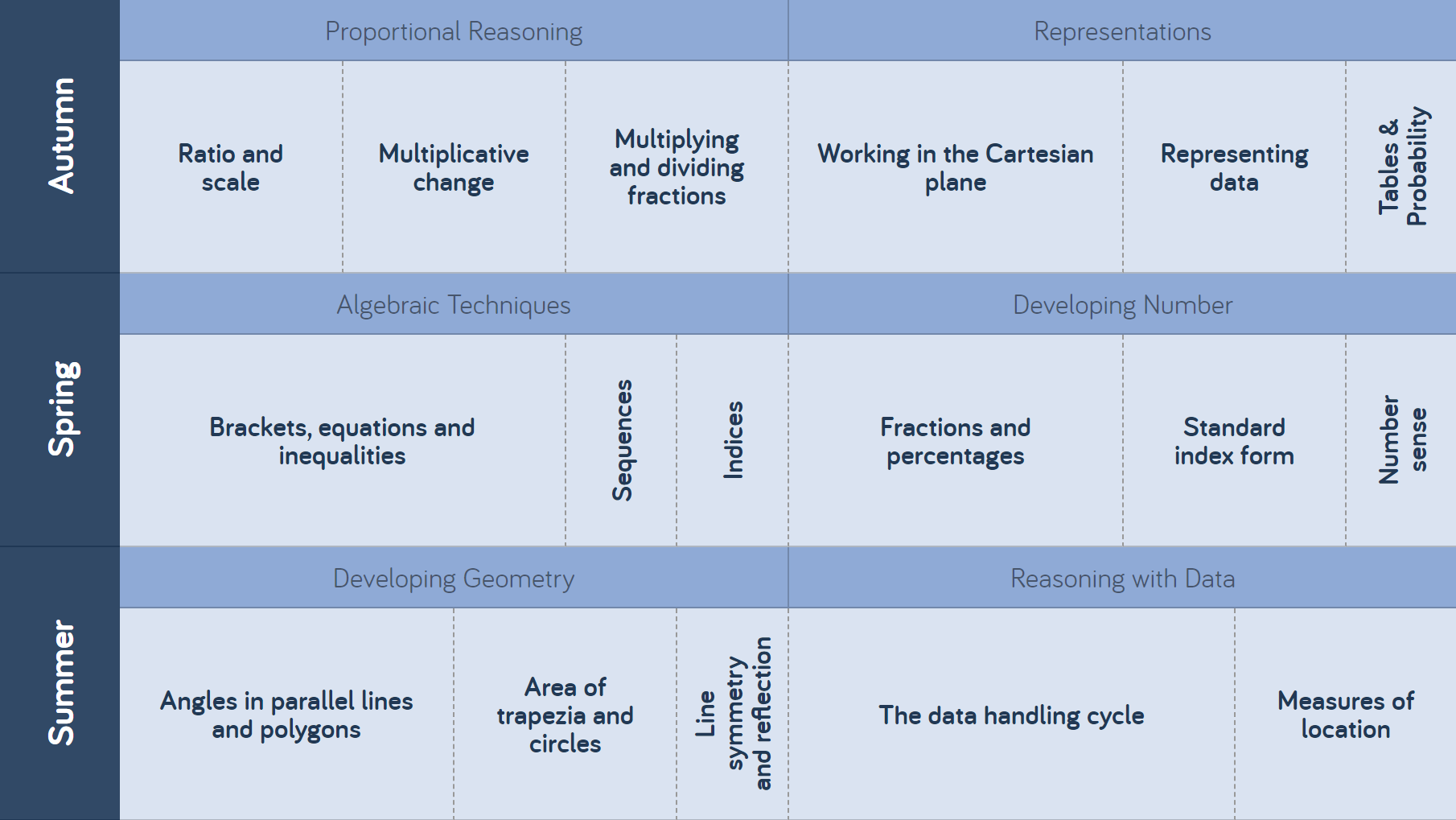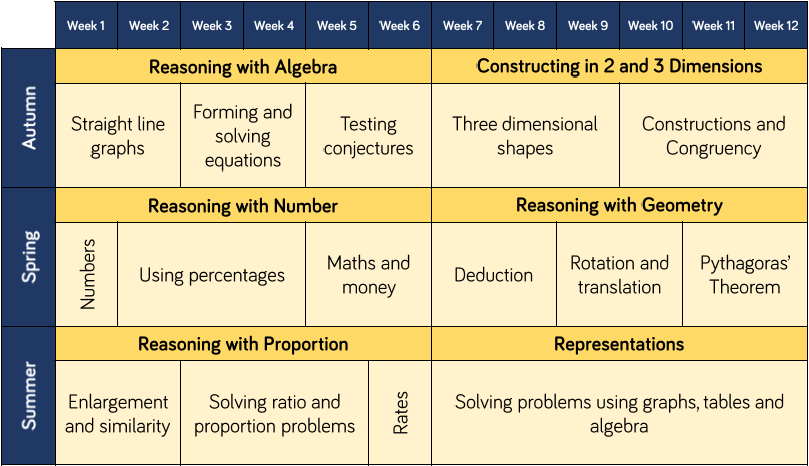Mathematics

Mr. Park
Assistant Headteacher
Director of Mathematics
Welcome to the Maths Department, my name is Mr. Park and I am Assistant Headteacher and Director of Mathematics.
We currently have 11 staff teaching Mathematics across all year groups. All our staff are passionate about the teaching and learning in their classrooms and will go out of their way to help all pupils succeed.
Our curriculum has been designed so that all pupils can excel in maths and build confidence. We use lots of pictorial representations and manipulatives in lessons to help pupils understand how maths works and not just a procedure. This helps pupils to apply their knowledge to other situations and areas of maths.
At Park High School, our goal is to inspire our learners to achieve an understanding of mathematical concepts. To achieve this, we undertake a mastery-focused approach which instils in all students that hard work leads to progress. It is our belief that achievement in Mathematics is for every learner and through our focus on understanding by way of a mastery-approach, we endeavour to make this a reality.
It is our belief that to build learners who are both resilient and confident, we must ensure the journey begins in Year 7 and continues consistently until our learners leave Park High School. To achieve this, our curriculum is focused on three main avenues:
- The utilisation of concrete and pictorial representations to increase the ability of students to access the underlying concepts of Mathematics rather than just utilising a procedure.
- Ensuring that knowledge is sequenced such that learners can understand how a topic links with the wider Mathematical landscape and coupling this with regular, varied retrieval practices to cement gained understanding into long-term memory.
- The application of Mathematical fluency, with learners accessing topics and tasks which interleave throughout the Mathematics curriculum, as well as drawing on real-world problem-solving activities.
Our Curriculum
Our students broadly follow the White Rose Maths scheme of work, tailored to suit our school community.
This scheme allows all learners to access the same work, giving them the breadth to challenge their ability. We encourage active engagement in our lessons with the use of manipulatives, including counters, interlocking cubes, Cuisenaire rods and tiles. Research suggests that their use is beneficial to mathematical understanding, and can help our learners with retention, problem-solving and reasoning.
Click here for the 5-year overview
Assessments
Judgements based on Curriculum-Related Expectations (CRE's)
Each unit is assessed through a variety of homework and classwork tasks together with summative assessments at the end of each term. Our assessments help our teachers and pupils identify which topics they need to revisit and work on, and these are then included on subsequent homework sheets and in-class retrieval tasks.
Judgements will be made by the Mathematics department based on assessments and classwork on the progression in the curriculum at the end of the Autumn, Spring and Summer Term. Teachers will report home progression in the Mathematics curriculum in terms of Beginning, Not Yet Expected Standard, working at the Expected Standard and working at Greater Depth.
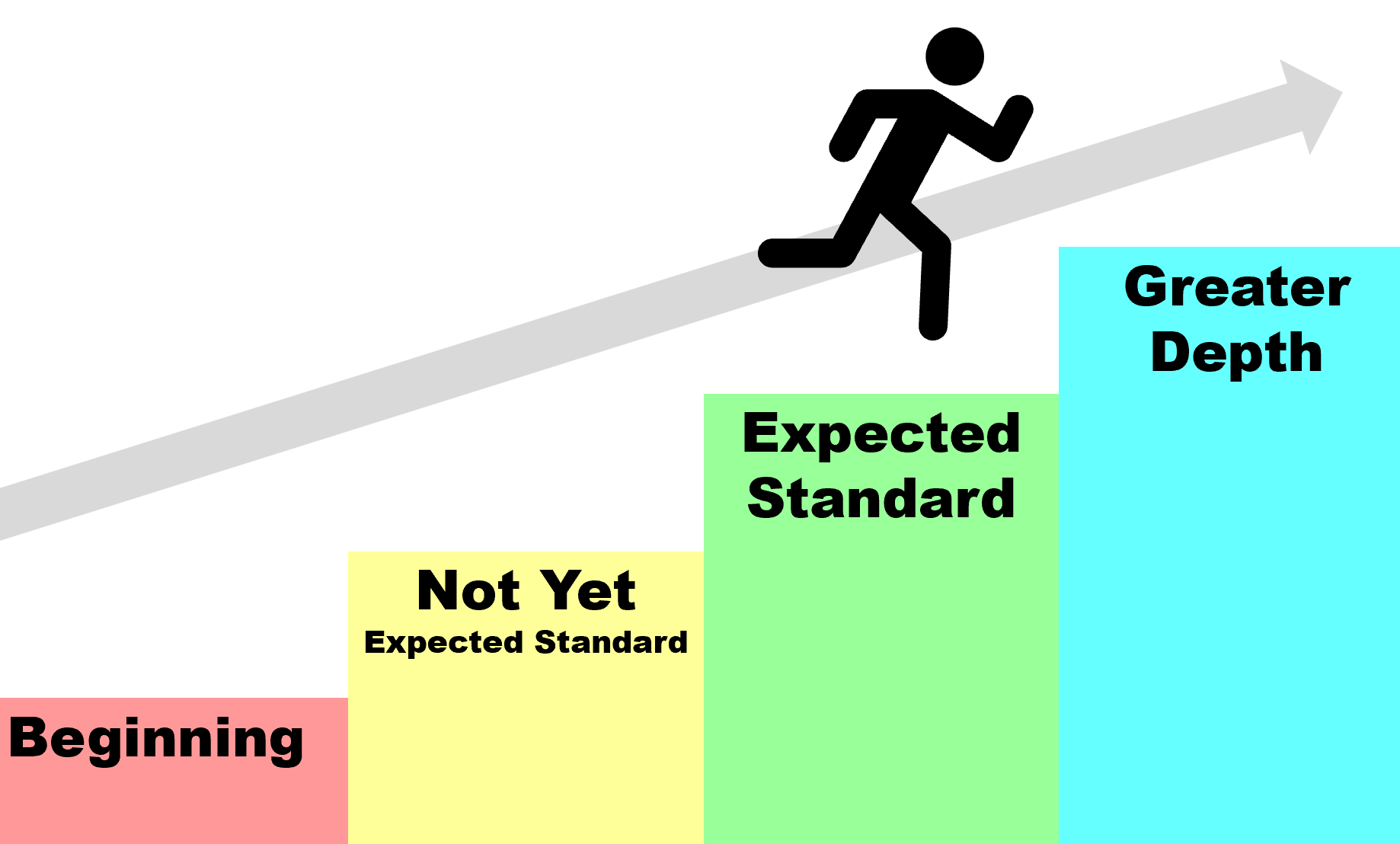
Year 7
CRE 1 - Students can describe and continue both linear and non-linear sequences.
CRE 2 - Students understand how function machines can be used to move freely between numerical, algebraic and graphical representations.
CRE 3 - Students understand what like-terms are through an appreciation of equality and equivalence and be able to simplify expressions.
CRE 4 - Students build upon their knowledge of fact families and inverse operations and apply this to forming and solving one-step equations.
CRE 5 - Students can compare and order positive numbers, including decimals, round to an appropriate degree of accuracy and calculate the range and median of a set of numbers.
CRE 6 - Students can move freely between different numerical representations (key fractions, decimals and percentages), utilising their knowledge of equivalence to compare.
CRE 7 - Students can apply addition and subtraction to integers and decimals using relationships between operations (including inverse operations). Students can utilise formulae to solve problems and construct/interpret appropriate tables and diagrams.
CRE 8 - Students can use formal written methods to find a percentage or fraction of an amount.
CRE 9 - Students can apply the four operations to both positive and negative integers. They can understand the relationship between squares and square roots. They can utilise this knowledge to solve one and two-step equations.
CRE 10 - Students have expanded on their previous knowledge of the number system to now include all decimals (terminating) and fractions. Students can utilise this knowledge to add and subtract fractions, including algebra.
CRE 11 - Students have built on previous skills by using rulers and protractors to construct and measure a variety of angles and shapes. Students can apply this knowledge to use a protractor to construct a pie chart as well as interpret data from a completed pie chart.
CRE 12 - Students can apply the knowledge of various angle facts to find missing angles in a variety of situations, including forming short chains of reasoning.
CRE 13 - Students can select and use appropriate mental calculation strategies with a focus on using known facts to simplify calculations and find other facts.
CRE 14 - Students are able to identify sets, complete a Venn diagram and understand set notation. Students can use probability vocabulary with an understanding that probabilities sum to 1.
CRE 15 - Students can use the concepts and vocabulary of prime numbers, factors, multiples, common factors, common multiples, HCF, LCM and prime factorisation.
Year 8
CRE 1 - Students can understand quantities expressed as a ratio or a fraction. They can also divide a given quantity into two parts, expressing it in the form 1:n and simplifying the ratio into its simplest form.
CRE 2 - Students can extend their knowledge of ratio and proportion to include the use of scale factors in similar shapes, scale diagrams and maps. They can also complete conversions of measures utilising conversion graphs.
CRE 3 - Students have deepened their understanding of multiplying and dividing fractions; this includes the reciprocal and its uses.
CRE 4 - Students have built on their knowledge of coordinates, plotting straight line graphs starting with lines parallel to the axes and moving on to the more general form.
CRE 5 - Students can understand linear correlation. They can also define the types of data, including continuous, discrete, qualitative, quantitative, primary, and secondary.
CRE 6 - Students can generate theoretical sample space diagrams, two-way tables and Venn diagrams and find the probability of a given event from any of them.
CRE 7 - Students can simplify algebraic expressions by collecting like terms, multiplying a single term over a bracket, taking out common factors and expanding products of two or more binomials. They can also use algebraic methods to solve one and two-step equations and inequalities.
CRE 8 - Students can generate terms of a sequence from either a term-to-term or a position-to-term rule.
CRE 9 - Students can simplify algebraic expressions by collecting like terms, using index laws or a combination of both.
CRE 10 - Students have investigated the relationship between fractions, decimals and percentages, using different methods to work out percentage increase and decrease, writing one value as a percentage of another.
CRE 11 - Students have extended knowledge of indices to convert numbers to and from standard form, interpret and compare numbers in standard form and apply the four operations.
CRE 12 - Students build on their knowledge of round numbers by applying this to find estimates for given calculations. They have examined metric unit conversions to revisit multiplication and division by powers of 10 and solve problems using time and the calendar.
CRE 13 - Reviewing basic angle relationships, students have demonstrated an understanding of angles in parallel lines, including solving problems with alternate and corresponding angles and extending to find interior and exterior angles in polygons.
CRE 14 - Students revisit area of rectangles, parallelograms and triangles to build on their knowledge of area to calculate the area and solve problems involving the perimeter and area of circles.
CRE 15 - Students can describe, sketch and draw notations including points, lines, parallel lines, perpendicular lines, right angles, regular polygons and other polygons. They can identify properties and describe the result of a reflection.
CRE 16 - Students can describe, interpret types of data including discrete, continuous, and grouped data. They can construct and interpret appropriate tables, charts, and diagrams for ungrouped and grouped data. These include frequency tables, bar charts, pie charts and pictograms.
CRE 17 - Students can compare appropriate measures which include mean, mode and median and the spread of the data using the range with consideration of outliers.
Year 9
CRE 1 - Students have shown they can recognise and plot a linear function, understanding the general form of y=mx+c, interpreting the gradient (m) and y-intercept in abstract and real-life contexts.
CRE 2 - Students have developed an understanding of manipulating expressions to aid in rearranging formulae as well as forming and solving one- and two-step equations and inequalities, including where the variable is on both sides.
CRE 3 - Students have strengthened their number sense skills to find common factors and multiples, extending to form assumptions about numerical patterns and relationships, developing algebraic links and generalisations to prove and disprove conjectures.
CRE 4 - By extending their knowledge of 2-dimensional area, students have shown an understanding of the properties, surface area and volume of 3-dimensional shapes and their different representations.
CRE 5 - Students have demonstrated their understanding of the construction of line segments and angles in geometric figures, including the interpretation of scale drawings. Students can use standard ruler and compass constructions in an abstract manner and to represent real-life scenarios.
CRE 6 - Students have extended their number skills to include solving problems involving fractions, directed numbers and standard form.
CRE 7 - Students have shown they can solve problems involving percentages and percentage change, including percentage increase, decrease and finding the original amount.
CRE 8 - Students have studied finance ideas of tax and wages, percentages in context, including VAT, simple and compound interest.
CRE 9 - Students have revisited angle facts, applying them to increasingly complex problems, including forming and solving algebraic expressions/equations relating to these facts. Students have examined geometric figures, spotted patterns, and formed conjectures.
CRE 10 - Students have performed translations, rotations and reflections on geometric figures, identified properties and described the results of these transformations.
CRE 11 - By investigating the relationship between the sides of right-angled triangles, students have used Pythagoras’ Theorem in a variety of contexts, including coordinate axes.
CRE 12 - Students have recapped similarity, extending to construct similar shapes by enlargement using a scale factor. Students have enlarged shapes with and without a coordinate grid, exploring angle and side properties.
CRE 13 - Students have shown they can apply fraction and ratio skills to multistep problems, including numerical and graphical direct and inverse proportion problems.
CRE 14 - Students have investigated compound units such as speed and density to solve problems, including exploring flow rate problems.
CRE 15 - Students have explored a variety of diagrams that support probability, such as sample spaces, two-way tables and Venn and tree diagrams, demonstrating their understanding of mutually exclusive probability and probability rules.
Year 7
Year 8
Year 9
Year 10
GCSE Maths
Year 10 will be studying:
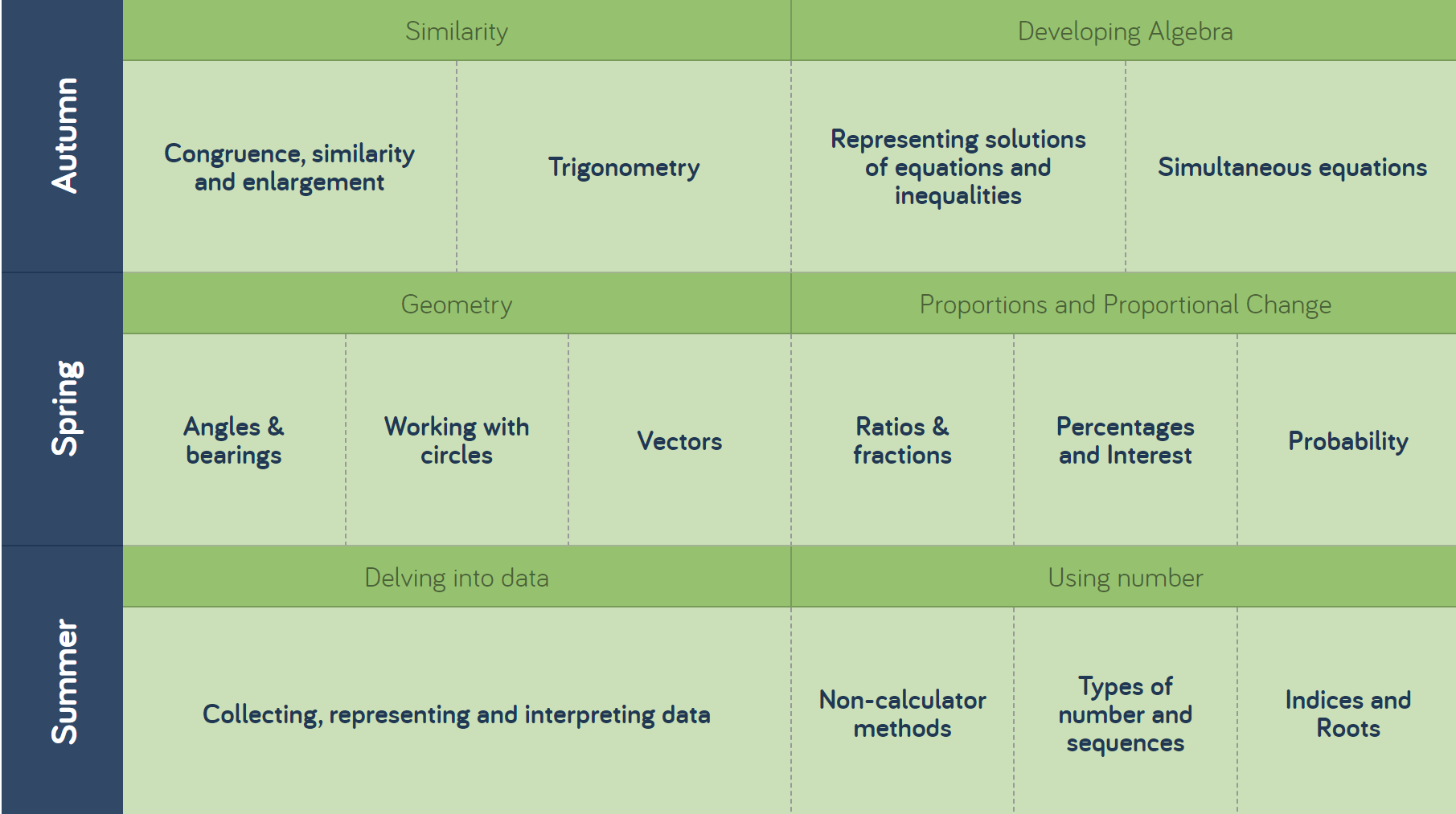
Assessment
Each unit is assessed through a variety of homework and classwork tasks together with summative assessments at the end of each term. Our assessments help our teachers and pupils identify which topics they need to revisit and work on, and these are then included on subsequent homework sheets and in-class retrieval tasks.
Year 11
GCSE Maths
Year 11 will be studying:
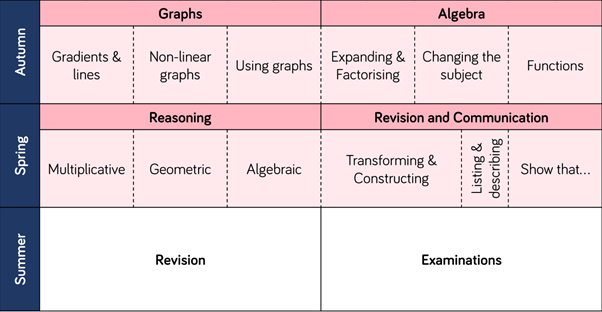
Assessment
Each unit is assessed through a variety of homework and classwork tasks together with summative assessments at the end of each term. Our assessments help our teachers and pupils identify which topics they need to revisit and work on, and these are then included on subsequent homework sheets and in-class retrieval tasks.
GCSE Examinations
We currently follow the GCSE (9–1) exam specification from Pearson / Edexcel
Here is the link to the specific content:
https://qualifications.pearson.com/en/qualifications/edexcel-gcses/mathematics-2015.html
Pupils will sit 3 exams in maths at GCSE level:
Paper 1 – Non-Calculator
Paper 2 - Calculator
Paper 3 - Calculator
Each paper is out of 80 marks.
Each paper is 1hr 30 mins.
Pupils can sit Higher or Foundation Tier
Higher tier allows access to grades 4 – 9, Foundation Tier allows access to grades 1-5
How can I help my child?
- Ensure that your child has a scientific calculator (Casio fx-83gtx or Aurora AX595) which they bring to every Mathematics lesson, a protractor and a compass would also be useful.
- Encourage your child to practise key skills regularly i.e. mental addition, subtraction, multiplication and division.
- Encourage your child to regularly use the Dr. Frost website to revise topics already covered and to look ahead at topics which will be studied in the future.
- Encourage pupils to complete all homework to a good standard.
- Look for opportunities to discuss with your child how you use Maths in everyday life. The new GCSE syllabus contains functional questions which link Maths to the real world. Questions cover areas such as booking holidays, reading bus and train timetables, converting currency, decorating rooms, comparing the cost of different goods and services and calculating the monthly cost of gas and electricity.
For Year 10 &11
- Encourage them to attend revision workshops prior to examinations and weekly interventions.
- Encourage them to complete past papers either on Dr. Frost or on MathsGenie.
Useful links:
|
mathsgenie – https://www.mathsgenie.co.uk/gcse.html This site contains GCSE Mathematics videos, exam worksheets and written solutions for different grades of topics.
|
|
drfrostmaths – https://www.drfrostmaths.com/index.php Access to online past papers which can be completed and automatically marked. Pupils can also access help videos and practise quizzes |
|
|
|
Corbettmaths- https://corbettmaths.com/contents/ Access to topic videos and practise questions – these are often referred to on our exam QLA’s for pupils to use to fill in knowledge gaps
|

